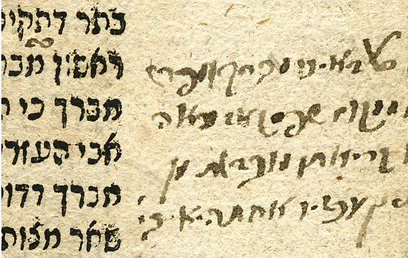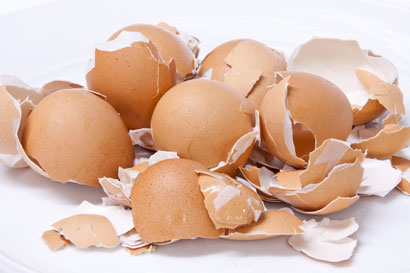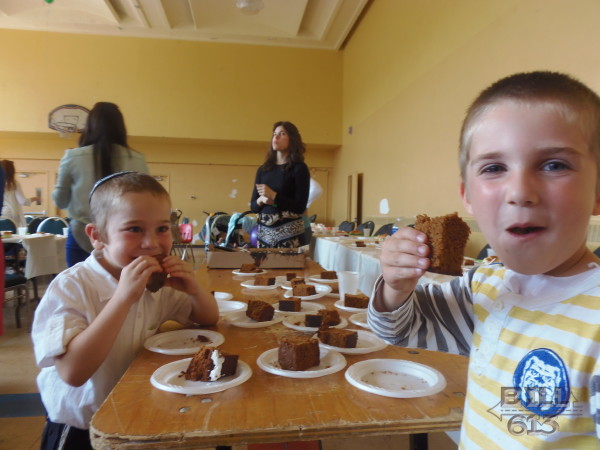Beitza 4a.
A unique expression in Shas.
1- The Gemara has an interesting answer on the question we encountered last week.
Actually, such an answer is rather rare in Shas!

hand written annotations by the Vilna Gaon
Reb Eliezer states:
‘An egg that is born (laid be’la”z) on Yom Tov can be eaten and also the chicken”.
The Gemara had difficulty understanding the “chicken” clause which seems redundant: If there is no issue of Nolad and Muktza then either the chicken or egg can be eaten. So why state both?
The Gemara answers this by introducing another Beraisa where Reb Eliezer states the same Halacha but words it differently:
‘An egg that is born on Yom Tov can be eaten and also the chicken, and also the chick, and also its shell“!

“its shell?” Wow! Who eats egg shells?

Obviously, the “shell” was added as a figure of speech – an exaggeration to emphasize the point that there is nothing wrong in eating this Yom Tov-born egg.
Like saying:
Go ahead, eat the egg… and its shell too.

Similarly, when Reb Eliezer said ‘An egg that is born on Yom Tov can be eaten and also the chicken” he meant to emphasize his point by saying that not only the egg permitted but also the mother-chicken.
In the words of our Gemore such sayings are a “guzma”.

Yom Tov- Shabbos-Yom Tov
2- We entered the next stage discussing eggs born on Shabbos and the first day of Yom Tov.
Whereas until now we were dealing with an egg born on the second day – meaning a Yom Tov occurring on a Sunday or Friday.
Now we begin discussing if an egg was born on Friday which is a Yom Tov or on Shabbos which is followed by a Yom Tov on Sunday.
One cannot eat the egg on the day it was born as discussed at length in our Gemara up to this point. The question is whether or not it can be eaten on the following day.

Hachana Machine
We discussed the Tosfos which explains that the ‘birthing’ of the egg is also a ‘Hachana’.
Reb Elazar Hakalir

3- The Gemore discusses the argument if a Shabbos followed by a Yom Tov, or vice versa, is considered as one entity or two.
As an introduction to the upcoming Gemara about two days of Yom Tov as we have it (Yom Tov Sheini Shel Goliyos) and also about the two days of Rosh Hashana if they are considered as one entity or two we ventured off to an interesting topic.
We just scratched the surface of the centuries old dispute concerning the identification of Reb Elazar Ha’Kalir. He is the famous poet that wrote numerous ‘Piyutim’ and Kinos. [In Nusach Ari we encounter just a few of them]. Hebrew English
But when did he live? the times of the Tannaim? Amoraim? The Geonim era or perhaps even later. His time has been set at different dates, from the second century, to the tenth or eleventh century. Some say he was none other than the famed Reb Elazar, Rashbi’s son!!
The name HaKalir is interesting and perhaps a hint to his biography.
Reb Noson of Rome, one of the first Rishonim, wrote what is considered the first ‘Hebrew/Aramaic’ dictionary. The Sefer Ho’Oruch is a book often quoted by many Rishonim and an invaluable source of history and philology (study of languages).
Under the entry ‘Kalir’ he writes that the word means….. cake.

“And that is why Reb Eliezer (sic) is called HaKalir because he ate a cake that had a ‘Ka’meah’ written on it and thus became enlightened!
See here 3rd entry for Kalir

See here in the back of the machzor, a teshuva about piyutim all the opinions of the identity of R Eliezer Hakalir and why he is sometimes called “Beribi”.
[This phenomenal historical tidbit is perhaps a source of writing words of Torah on cookies when bringing in a child to Cheder for the first time. Or perhaps the source of ‘eating the cake and having it  too’…..]
too’…..]
Anyway, one of the proofs by the Rosh that he lived in the times of the Tanoyim is from the fact he did not write any Piyut for the second day of any Yom Tov. This must mean that he lived at a time that only one day Yom Tov was prevalent.
The Alter Rebbe. 68,2 accepts this proof.
But what about Rosh Hashana that was/is always two days even in Israel? More to follow in the next few weeks בעזה”י.